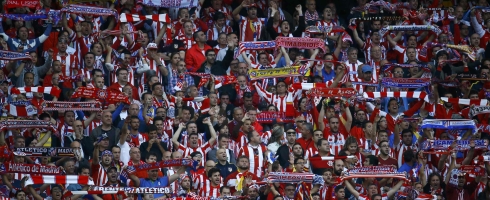A week ago, El Frente Atletico hadn’t a care in the world. Seven days later, they have been expelled from Vicente Calderon and are public enemy number one and not before time.
As the shock and disgust from last week’s violence wears off and action appears to be taken, one big question remains. How do the Ultras finance themselves? The media and the police portray them as uneducated individuals and we are led to believe that many of them of them are either unemployed or in low paid jobs.
Yet, the Ultras can still afford to go to games abroad and pay for huge tifos, the spectacular choreography often seen before games. So where does the money come from?
Finding out exactly how the organisations are funded isn’t easy. Ultra groups aren’t very forthcoming with their balance sheets, even though some are registered organisations. A piece in AS this week took an in depth look at to how the organisations are allegedly financed and some of the ways will raise more than a few eyebrows.
Some groups are reported to have bars or to take a share of the profits from bars around the grounds on match days. For big clubs, this can be very lucrative. But, away games seem to be where the big money is made. In the past clubs were said to have paid for the Ultras to travel abroad but as times have changed, now they have had to make their own way – according to AS they travel by chartered plane to their destination.
It is claimed that a chartered plane can be booked for €15,000 but that tickets from the Ultras organising the flight can cost around €300 per person or more. This would make the group a tidy little profit. It is alleged that the same process is applied to fixtures in Spain when the fans travel by bus to away games.
Another steady income is the Spanish state Christmas lottery that provides an opportunity to raise funds. Community and social organisations sell tickets with a small part of the sale going to the club or organisation. For some groups, it’s the difference between survival or closure and the Ultras seem to have gotten wise to it too.
The Ultras buy a series of lottery tickets, which have the date of their founding and sell them to members. The greater number of ‘socios’ the greater the profits and this can be very lucrative.
lso any member of an Ultra group is expected to pay a membership fee, another healthy source of income. With ticket sales, donations and other on the side activities, the Ultras appear to have a strong bank balance.
Until last week it seemed that most clubs were happy to let the Ultras into the grounds. For years strong rumours have circulated about relationships between clubs and Ultras and exactly how involved the clubs are with their more fanatical support and more importantly how they were involved financially. In one piece from El Confidencial this week, it is suggested that clubs and even some players have aided the Ultra’s coffers.
The piece, published earlier this week, claims that clubs have been known to pay for ‘fans’ to travel to games to create an atmosphere in the ground for the players. One Ultra, who preferred to remain unnamed, said that the reason he had joined his group was because it was cheaper to travel with the Ultras who received discounted rates than to travel with regular fans.
El Confidencial also claims that some players pay off the Ultras so that they don’t get abuse from the stands. While there in no evidence to confirm or deny this, it is truly worrying if there is any degree of truth to it. It has also been pointed out by other publications that players have allowed Ultras to use their names for their various factions, something that some believe shows the Ultras are more connected than we have been led to believe.
Another important way to raise funds is the selling of merchandise. At home games, fans can be seen dressed in t-shirts, scarves and other items and the sales really boost the coffers. In some cases the Ultras are believed to be selling their products under the noses of the clubs.
This week the Spanish television station La Sexta claimed El Frente Atletico sold their merchandising inside the Calderon. The club denied it completely but La Sexta is sticking to their guns. Atletico have threatened to deny La Sexta entry to the stadium, claiming that they have never accommodated the Ultras.
Atletico have strongly denied having links with El Frente but La Sexta have found and shown videos of a storage room in Vicente Calderon where El Frente banners can be seen. It is not unusual in Spain for supporters groups to leave their banners at grounds – in fact it is a little practical – but what is interesting is the fact that after protesting much to the contrary, Atletico have been shown to be wrong.
Atletico were originally seen as burying their head in the sand but since the start of the week, they have been applauded for finally stepping up. But, the question is for how long can they hold this stance?
Right now all the focus is on the Ultras and where they get their money from and whilst the Ultras may lose money from not attending games, clubs will definitely do so. Can they continue to expel them, knowing that a major revenue stream has been cut? Time can only tell.

